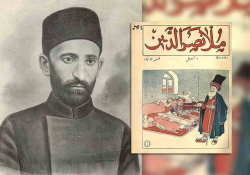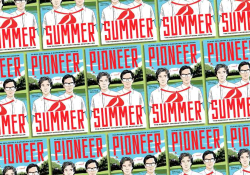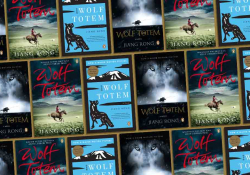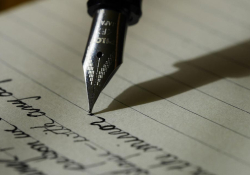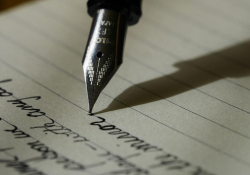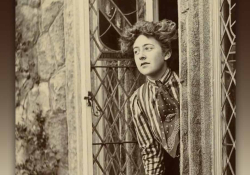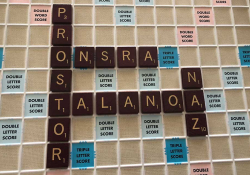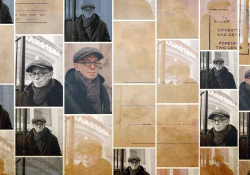Stories Beyond the Binding: A Conversation with E-book Publisher EJ Van Lanen
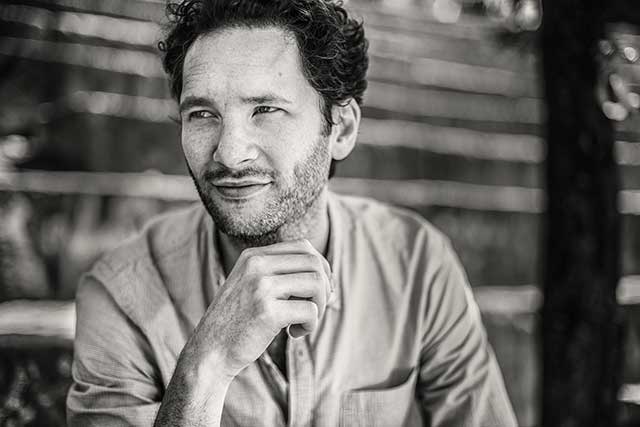
Which is better, print or online? Which is more helpful to the cause of advancing translated literature, starting a publishing company or something else? The literary world is abuzz with debate. Two years ago EJ Van Lanen, already at work publishing translated literature, began a new venture: publishing translated literature, but only in digital format. Here WLT talks with Van Lanen about this enterprise, Frisch & Co., and whether he’s been praised or pilloried since moving into the e-book market.
Michelle Johnson: You’ve worked at Ecco, Dalkey Archive, and cofounded Open Letter Books, all of whom publish translated literature. So you aren’t the new kid on the block, bursting onto the scene with nothing but a love for international literature and your e-reader. How difficult was this decision to begin your own, e-book-only venture?
EJ Van Lanen: The decision to start an e-book-only publisher wasn’t especially difficult, to be honest. It was tough conceptually; that is, finding a way to publish the books in a way that made sense to authors, readers, translators, and publishers alike. But the idea of publishing e-book-only wasn’t something I agonized over. It seemed to me a good way to publish translations, and an excellent opportunity to see if there were possibilities of using e-books to expand both the number of voices that were available to readers of English and the audience for authors and translators.
MJ: Though I’m watching this change rapidly, I still suspect that some reviewers, authors, translators, and readers are a bit suspicious of a book that isn’t produced in print. Have you run up against any negative presumptions? Are there people who think of online publishing as a consolation prize, of sorts?
EJVL: Oh sure, I’ve run into some skepticism, though it expresses itself differently across each of the groups you mention. Traditional review outlets, for example, can occasionally be tough to convince, though I imagine every small publisher, e-book or print, would say the same thing. So it’s tough to know whether or not e-books are the problem; in one or two cases I’ve been told it is, but they’re decidedly in the minority.
Authors have been welcoming. Some because there’s less at stake for them—they have a print edition in their home countries/languages, and an English edition, in whatever form, isn’t necessarily something they want to focus on—some because they’re curious about e-books. But I haven’t had anyone reject the idea of an e-book edition in English. Translators have been interested as well.
Anyway, the skepticism that I’ve encountered is both understandable and reasonable, it seems to me. E-books are something new. But for the most part people have been more curious about Frisch & Co. and what we’re doing than resistant.
MJ: I’m reading a book by Phyllis Rose called The Shelf. She reads her way through the LEQ–LES shelf of the New York Society Library. When she gets to Lermontov’s A Hero of Our Time, she’s initially delighted that the copy available is a 1960s Doubleday Anchor Original translated by Nabokov and his son, Dmitri. She writes, “Moreover, I loved the book as an object. Its very size, the modest dimensions of yesteryear, produced nostalgia.” Continuing, she comments at length on the cover design, “a small masterpiece of graphic design.” Yet she discovers that the physical book ended up coming between her and the text: small print, crumbling pages, greasy cover. And Nabokov’s prefatory and footnote intrusions get in her way. She ends up reading the original 1853 translation on her e-reader and making a discovery: “The ideal of translation as a pane of glass becomes embodied when you read on a Kindle or a Nook. Nothing comes between you and the text, certainly no object reminding you distressingly of age and decay.” Do you have any thoughts on how reading on an e-reader is a different experience than reading a printed book?
EJVL: I suppose I would focus on what’s the same. When an e-book is designed well—and this is far from a guarantee, unfortunately, as many shoddy conversions are floating around—I find the reading experiences to be the same. I’m pulled into the story the same way; after I’m done reading, the story lingers in my mind the same way; if it’s a good story, I feel the same urge to tell someone about it; I have the same enthusiasm for the writing, if it’s done well; and I wish I could draw so much out of the world with my words as great writing does, just like every other time I read something exciting.
The novel, or the story, is not coterminous with the book—the book is a delivery system, a very good one, but it is a separate entity from the story the book conveys. And that story can be conveyed by any number of different means, or in any number of different vehicles.
What’s interesting about Ms. Rose’s quote to me is that she points to something we seem to forget from time to time. The novel, or the story, is not coterminous with the book—the book is a delivery system, a very good one, but it is a separate entity from the story the book conveys. And that story can be conveyed by any number of different means, or in any number of different vehicles. Books are one, e-books are one, scrolls used to be one. Each of those vehicles has strengths and weaknesses. Books are wonderful, there’s no doubt about it, but they age, and they fall apart, and they take up lots of space, and they can be bound cheaply or printed on bad paper, and they can be covered in other people’s bad notes. E-books can also be wonderful, but they can be poorly designed, and the devices can be obnoxious, and they can’t be displayed on a shelf, and you can’t scribble in them. And so on. But the story remains the same.
E-books don’t differ so much in the reading, it’s the actual acquiring of the books that is something new. You can’t just pick them up at the bookstore, or pluck one off of your friend’s shelf. There’s a different infrastructure that readers need to deal with—devices, stores, etc. I think it’s that infrastructure that puts people off more than anything. The actual reading, to me it’s more or less the same.
MJ: What are the differences between an e-book that’s done well and one that isn’t?
EJVL: I've seen all sorts of things in e-books. Sometimes the text has been scanned in the text, I suppose using OCR [optical character recognition], and letters are transposed or incorrect, an l becomes a 1, for example, and they’re clearly not proofread or corrected. Or the e-books are converted from the InDesign file that gets sent to the printer and the conversions don’t necessarily take the e-book into account, so there will be page numbers from the book running in the text, or in the middle of the page breaking two sentences in half. Or the pages break where they break in the printed book, without regard for the fact that the pages need to be reflowed for each device the e-book would be displayed on. In the main, it’s because e-books were treated as secondary. It seems to be less of a problem now, as most publishers have integrated e-books into their workflow from the beginning, but there was lots of catching up to do, thousands of books to convert, and certain shortcuts were taken in the past. It’s a shame because everyone who sees one of these, especially if it’s their first e-book, will generalize to all e-books, and some publishers take a lot of care that their e-books will display cleanly and legibly and look good as e-books.
MJ: Why not have a print-on-demand option? Would that pull back in too many of the expenses you’ve managed to eliminate?
EJVL: POD is something I’ve considered and will continue to think about. From my partners’ perspective, there’s the possibility that Frisch & Co.’s e-book edition might drive interest in a print sale in the US/UK/etc., and having a print-on-demand option would put an end to that possibility. And, also from their perspective, having a print publisher who was invested only in making a print edition would be better than having Frisch & Co. do a print-on-demand edition as a sideline to the e-book. At the same time, it’s best for Frisch & Co., at the moment, to focus on figuring out how best to publish and promote e-books. These calculations might change later on, of course, but we’re going to stick with e-book-only for the foreseeable future.
MJ: In addition to explaining the financial bases for your move to e-books, you also explain the economies of time: in other words, how you have made selecting projects more efficient by relying on a small group of partners rather than getting lost in the sea of available information. Now that you’ve been at this for a while, how is that working? Are you tempted to widen your net by increasing your partnership group?
EJVL: I’m more than pleased with how it’s working so far. Our list is fantastic. We just published our first book from Brazil’s Companhia das Letras, Zulmira Ribeiro Tavares’s Family Heirlooms. Zulmira is a real find, a great author, and we’ll be publishing more of her in the future. And we just added a couple of new partners: Natur & Kultur in Sweden and Atlas Contact in the Netherlands, two world-class literary publishers. We’ll have our first books out from them early next year, Sami Said’s Hardly Ever Nice and Hanna Bervoets’s Everything There Was. We’ll be acquiring a few books from China (very) soon, and there are some possibilities in Arabic and from Turkey that we’re exploring now. I wouldn’t say that Frisch & Co.’s model is the best, or that everyone should be adopting it, but it’s been productive for us.
As far as widening the partnership group goes, we’re definitely looking to add more countries—France is a big gap right now—but I’m happy with the coverage we’re getting so far. One way we’ll be growing our list is by looking to do some “reprints” (I’m not sure exactly what to call it, since they’re e-books), as there are so many good books that don’t have e-book editions yet, for various reasons. But we’ll be doing those on the one-off model, and not as partnerships.
MJ: What role does being located in Berlin play in your business model? Could you be located anywhere?
EJVL: When I came to Berlin, it was with the idea that an e-book publisher could be located anywhere, and it seemed to make sense to live in a place with a great publishing infrastructure that didn’t have the same living costs as London or New York, which would be the more obvious places to base things. This has proven to be both true and not true. There is, naturally, a value in being there that I miss out on—I’m not having lunches or meeting English-language media people at cocktails, that sort of thing, which is incredibly valuable in publishing. You can’t replicate that with Skype or email.
On the other hand, there is a strong English-language community of publishing people in Berlin—booksellers, translators, publishers—who have been immensely supportive of Frisch & Co.—Sharmaine Lovegrove and her crew at Dialogue Books have been especially helpful. The community here, and the German media, have reacted to Frisch & Co. more positively, and with greater enthusiasm, than I might have expected to receive as one-of-many publishers in the US or the UK. And it’s been much easier to interact with my partner publishers here; I just have more opportunities to see them, which has been important as well.
MJ: In another interview, I’ve seen you talk about “the potential to create a real common space for literature in English translation” so that an English translation available in, say, the US is also available in other anglophone countries as well. I wonder, though, if online book purchasing isn’t already helping readers cross these barriers? Or do readers first need to discover a book in a library or bookstore?
EJVL: It’s true, you can order books to the US from Amazon.co.uk, for example, though it gets pricey and the delivery isn’t the speediest. But what I was trying to get at was the possibility of a simultaneous literary conversation—books being published, reviewed, and discussed at the same time in the US, the UK, Canada, Australia, etc. A few books and authors get to experience that—Karl Ove Knausgaard’s My Struggle is having such a moment now, and Stefan Zweig seems to be, too—but the vast majority of books exist only in one place or another. Most of the books I published at Open Letter were never made available in Canada, and Toronto was a three-hour drive from my house in Rochester, New York. That’s setting aside the difficulties of distributing in the UK. And it’s not for lack of effort—physical distribution is just difficult.
With e-books, that kind of publishing and discussion—international attention about international books—can become more common, and not only for books that are having some sort of breakout moment. It’s simply more easily facilitated by electronic distribution.
MJ: People have strong feelings about literary spaces such as bookstores and libraries. Have there been any negative reactions to your venture’s extraterritorial nature? You’re publishing books that don’t need brick-and-mortar homes, and we bibliophiles love to at least skulk around in these places, looking at the books and drinking coffee. Some of us still buy books there, even if they cost more, and check books out from libraries. On the one hand, you’re on the high road as someone publishing only translated literature. On the other, I see where you may sometimes be under attack for publishing only in a digital format.
We’re just trying to get literature into more places, to more readers, and we should make sure that e-book readers have the chance to discover great books for their devices, too.
EJVL: I haven’t had any negative reactions, no. Frisch & Co. is really only adding to the literature that’s made available to English readers, so that might explain it. We’re just trying to get literature into more places, to more readers, and we should make sure that e-book readers have the chance to discover great books for their devices, too.
MJ: Your business plan includes publishing ten books per year. Considering the dearth of literary translations into English, do you feel any pressure to increase this number?
EJVL: Ten per year was the plan, but last year we published five. Ten was perhaps a bit too optimistic. This year we’ll do between five and seven, depending on how things shake out.
Anyway, I’d love to do more, and in the long run we will. Though I wouldn’t say I feel any pressure exactly—it’s more that there are so many good books that one could be publishing, and it’s frustrating to know that you can’t do everything you’d like to do. Right now, it’s just a matter of resources and time.
MJ: What projects are in the Frisch & Co. pipeline?
EJVL: Next month, we’re starting a wonderful project. One of my favorite novelists, Andreas Maier, started writing a series of novels a few years ago, about his family, his childhood, the town he grew up in—it’s a panoramic view of postwar Germany as experienced in a small town outside Frankfurt. Eventually, he plans to write somewhere between seven and ten novels in the series. We’ve already signed up the first three, and we’ll keep up with him as long as he decides to go.
Jamie Lee Searle has produced a beautiful translation of the first one for us. It’s called The Room, and it’s the story of Maier’s Uncle J, who had a sort of mental disability and worked at the post office in Frankfurt. We follow him to work, as he makes a visit to a brothel in Frankfurt’s red-light district, as he travels to his beloved drinking establishment to listen to hunting stories, as he encounters the Americans who still have a base outside the town they occupied just after the war, and we witness the world changing all around him as he remains mostly puzzled and unaware of what has happened in Germany, or what is happening to him or his family. The novel occupies this territory between fiction and biography, or it’s explicitly fictionalizing biography to address questions that couldn’t be gotten at any other way. It’s an arresting, incredibly strong work.
And in November, we’re doing a cooperation with Allen Lane in the UK. They’re doing a print version of one of our titles, Uwe Tellkamp’s The Tower—it’s an epic novel about the last days of East Germany, a huge best-seller here in Germany when it was published—and we’re partnering up to sell the e-book edition worldwide. It’s the first time Frisch & Co. has done something like this, so I’m curious to see how it could work, and if it’s a way for more of our books to find their way into print.
EJ Van Lanen is the founder and publisher of Frisch & Co. A lifelong devotee of literature in translation, he has edited and published work by Dubravka Ugresic, Jan Kjærstad, Mathias Énard, Gabriel Josipovici, Ingrid Winterbach, and Mikhail Shishkin, among many others, at Ecco, Dalkey Archive Press, and Open Letter Books, which he co-founded in 2007. You can follow him @ejvanlanen.
